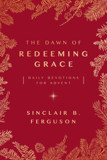
They say time is relative, and it can certainly seem that way as Christmas approaches. To a busy parent—with presents to wrap, cards to send, meals to prepare, and spare batteries to remember to buy—time seems to fly. There is not enough of it—and there is simply too much to do.
But to a child, the days of December seem the longest in the whole year; they pass more slowly than the last few miles of a tedious journey. No wonder C. S. Lewis’s description of Narnia as a land where it was “always winter but never Christmas” resonates with children. They do not need to go through the back of a wardrobe to feel that—all you do is turn the calendar to the month of December!

Advent devotional for Christmas that will stir hope and inspire worship.

Today’s children are not the first to think that Christmas can’t come soon enough. Indeed, that was the feeling of generations of Old Testament believers: a feeling picked up in the words of Charles Wesley’s hymn “Hark! The Herald Angels Sing”:
Late in time behold him come,
Offspring of the Virgin’s womb.
Our own experience sometimes gives certain words an atmosphere unique to ourselves. Perfectly innocent words can have a chilling effect on our emotions! For me, “late” is one of them. I cannot hear it without feeling that I am being accused! Perhaps it is because I can still hear in my mind the shrill voice of one of my teachers shouting at me, “Ferguson, you’re late” (when I wasn’t!). With that kind of memory, it is hardly surprising that to me the phrase “late in time” has a somewhat negative ring about it.
Was Jesus also “late”? No, Wesley did not mean Jesus came at the wrong time. But since God’s people had been hoping for his coming ever since the divine proclamation of Genesis 3:15 had promised the arrival of one who would bruise the serpent’s head, it must have seemed a very long time. The believers of the Old Testament were often heard crying out, “How long, Lord?” Would it always be winter but never the long-promised Christmas?
"God may seem slow, but he is always on time."
When it has been my responsibility to arrange the items of praise for the first Sunday in Advent, I have always chosen to begin with a 12th-century hymn that captures this sense of waiting and longing:
O come, O come,
Immanuel And ransom captive Israel,
That mourns in lonely exile here
Until the Son of God appear.
O come, Thou Rod of Jesse, free
Thine own from Satan’s tyranny;
From depths of hell thy people save,
And give them victory o’er the grave.
Rejoice! Rejoice! Immanuel
Shall come to thee, O Israel.
God may seem slow, but he is always on time. He has never been late. But if you read through the Bible from the beginning, there is something thrilling about turning over the blank page between the Old Testament and the New Testament. The first thing you encounter is Matthew’s summary of the long years of waiting (1:1-17). But now the snow is melting, and winter is giving way to Christmas (1:18 – 2:23). The arrival of the Lord Jesus is the dawn of a glorious new era.
Matthew’s Gospel begins with two chapters on the nativity. It may seem strange that he does little more than mention the actual event of that first Christmas Day. (“She had given birth to a son,” 1:25, and “After Jesus was born...”, 2:1; that is all he says.) But he has his reasons. Births take place every day of the year, ever hour of the day. But this birth was different, and Matthew wants to spend most of his time helping us to understand why it was.

As this Christmas approaches, I invite you to join me in exploring what Matthew says about those days that marked the dawn of redeeming grace and about how Christ’s light breaks into our lives today.
I am grateful to The Good Book Company for allowing me the rare privilege of writing a book that perhaps many thousands of people in different parts of the world will read simultaneously, even reading the same pages on the same days. By doing so, we become a great company of individuals united by the shared experience of reflecting on Matthew’s account of the birth of Jesus. It is the prologue to the greatest story of all—the story of Jesus. And it is one that will make many millions sing Joseph Mohr’s famous lines again this Christmas:
Silent night, holy night!
Son of God, love’s pure light,
Radiant beams from thy holy face
With the dawn of redeeming grace,
Jesus, Lord, at thy birth!
My prayer is that as you read, you will experience “the dawn of redeeming grace” because “Christ the Saviour is born.”
This article is adapted from The Dawn of Redeeming Grace by Sinclair Ferguson, an advent devotional for Christmas that will stir hope and inspire worship.